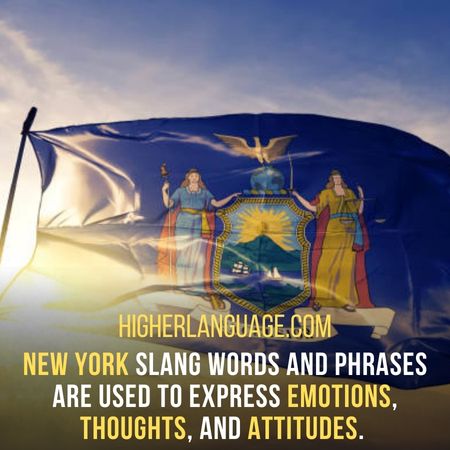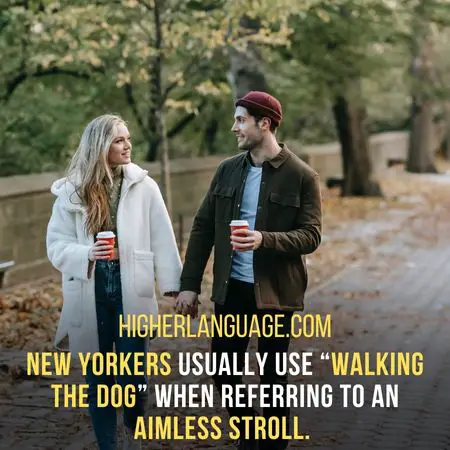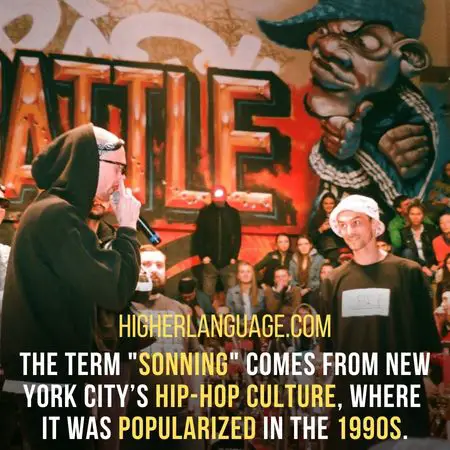New York has its unique and colorful way of speaking. New Yorkers are known for their creative use of language, which includes a wide range of New York slang words and phrases.
So whether you’re visiting New York City or want to sound like a New Yorker, here are some of the most popular New York slang words and phrases.
New York Slang Words And Phrases
Slang words and phrases are informal words and expressions that people use in everyday conversation.
New York slang is no different, and New Yorkers have a large vocabulary of their own.
From “knockin’ it out the park” to “shady,” New Yorkers often use slang words to express themselves more clearly or stand out.
New York is a melting pot of cultures with unique slang words and phrases. New Yorkers had used New York slang since the 1800s when immigrants arrived in the city.
New York slang also reflects the many languages spoken in the area, including English and Spanish.

New York slang words and phrases are used to express emotions, thoughts, and attitudes.
Some of the most popular New York slang words and phrases include “knock it out of the park,” meaning to do something well, and “bodega,” a neighborhood convenience store.
New Yorkers also use the phrase “son” as a term of endearment, and the word “bodega kitty” refers to the cats that often hang out in New York bodegas.
New Yorkers also shorten words like “apartment” to “apt.” This is the variety of slang you would expect to hear from New Yorkers.
23 Famous New York Slang Words And Phrases
New York slang is an important part of New York culture, and New Yorkers deeply connect to the words they use.
Slang words help New Yorkers express themselves uniquely and can often help bring people together.
New York slang is always changing, so it’s important to keep up with the latest lingo if you want to stay connected!
Here are some of the most famous New York slang words and phrases you should know:
1. Bodega:
It is one of the most iconic New York terms and refers to a neighborhood convenience store that often doubles as a gathering place for locals.

The term can also be used affectionately to refer to someone’s home or apartment. For example, New Yorkers might say, “Come over to my bodega!”
It is also used to describe a corner store. Such as, “Let’s head to the bodega and grab a snack.”
2. Knockin’ It Out The Park:
New Yorkers may use this phrase when something goes extremely well, often surprisingly or excitingly.
It is an upbeat expression used to emphasize success or brilliance. For example, new Yorkers might say, “That chef knocked it out of the park with that meal!”
It is also used to describe an impressive accomplishment or a great performance. For example, “That band really knocked it out the park at their last show.”
3. Catch The Air:
New Yorkers use this phrase to express surprise or shock. It can describe a person’s reaction to an unexpected event.
For example, new Yorkers might say, “I almost caught the air when I heard that news!” It is also used as a way to show enthusiasm or approval.
For example, “That artist really caught the air with their new album.”
The term “catch the air” is derived from New York City’s old fire alarm system, which would trigger bells that sent a “shiver of terror through the city.”
4. Knish:
This New York slang term refers to an ethnic food item – a pocket pastry filled with potatoes, cheese, kasha, and other ingredients.
New Yorkers may use “knish” to refer to any small food item or even as a synonym for something else entirely.
For example, New Yorkers might say, “I need to pick up a knife before heading home.” The term “knish” is actually derived from the Yiddish word “knees.”
5. Walking The Dog:
This New York slang term means wandering aimlessly, usually on foot. It can be used when someone needs time to think or even as a synonym for simply taking a walk.

New Yorkers usually use “walking the dog” when referring to an aimless stroll.
However, the term may also be used to describe someone who is not heading anywhere in particular.
6. On The Ropes:
When New Yorkers say someone or something is “on the ropes,” they mean that the subject is in a difficult situation and close to defeat.
It can refer to a boxer or any other person or thing in a time of trouble.
New Yorkers use this phrase to refer to anyone or anything close to being eliminated, whether in a game or in life.
For example, if someone is about to lose their job, New Yorkers would say they are “on the ropes.”
7. Down The Hatch:
This phrase is used by New Yorkers when something goes quickly or easily.
It can be used in various situations and contexts, such as when celebrating a job promotion or after completing a difficult task.
New Yorkers often use this phrase to express joy and relief, much like “bottoms up” or “cheers.”
The term is also used metaphorically to refer to any situation where something went smoothly or quickly.
8. On The Real:
New Yorkers use this phrase to emphasize that something is true and genuine.
New Yorkers often use this phrase, even when it isn’t necessary, to emphasize their point and ensure that the other person knows they’re being serious.
This phrase is often used to emphasize the truth of what a New Yorker is saying, such as when giving advice or sharing an opinion.
For example, a New Yorker might say, “If I were you, I’d do it on the real.”
9. Hit Me:
New Yorkers use this phrase to indicate that they need an answer or a response from someone else.

This can be used when they ask for advice, information, or feedback. For example, a New Yorker might say, “Hit me with your thoughts.”
The term “hit” implies that the New Yorker expects a quick response. It’s also a casual way to ask someone for their opinion.
10. Wassup:
This slang term, derived from the phrase “what’s up?” can be used as a greeting or an informal way to ask how someone is doing.
The phrase was made popular in New York City during the early 2000s. For example, New Yorkers might say, “Wassup, buddy?”
However, the term is most commonly used among friends and family, so it’s important to remember not to use it casually in unfamiliar or formal situations.
11. Hella:
New Yorkers often use this slang term as an exclamation of excitement. It is usually used when someone is surprised, impressed, or excited about something.
For example, New Yorkers might say, “That view is hella sweet!” The term can also be used as an emphasis on a statement.
For example, New Yorkers might say, “I was hella tired after that walk.”
The term is most commonly used among friends and family, so it’s important to remember not to use it casually in unfamiliar or formal situations.
12. Ghetto Fabulous:
This New York slang term is often used to describe someone who has a flashy or over-the-top style of dress.
It may also be used as an adjective to describe something as being “ghetto fabulous”.
New Yorkers often use this term in a lighthearted or joking manner, and it is usually used among friends.
Such as, “She was looking so ghetto fabulous at the party last night.” The phrase can also be used to express admiration or approval.
13. Gully/ Gullible:
This New York slang term is often used when describing someone who is gullible or naive.

It can also refer to someone who lacks street smarts and, therefore easy to manipulate.
New Yorkers might say something like, “He was so gullible; he believed everything I said.”
The term is also used as an adjective to describe something that is ridiculous or unbelievable. For example, New Yorkers might say, “That’s so gully!”
14. Shook:
New Yorkers often use this slang term to express shock, surprise, or disbelief in a situation.
For example, New Yorkers might say something like, “I was so shook when I heard the news.” The term can also be used to describe someone who is scared or intimidated.
For example, “He was so shook when he saw the size of the crowd.” Finally, the term is also used to describe someone who is overwhelmed with emotion.
For example, “She was so shook when she heard the news.”
15. Shine:
New Yorkers often use this term to refer to something that is impressive or desirable.
For example, New Yorkers might say something like, “That car is shining! It looks amazing!” or “That dress is shining! You look great!”
The phrase can also be used to describe someone who is confident, for example, “She was really shining on the stage last night.”
Finally, it can also refer to someone who is doing well in life, for example, “He’s really shining right now. He just got a promotion.”
16. Sonning:
In New York slang, sonning is an expression that means to tease or make fun of someone.
New Yorkers might use this phrase in a playful manner as an insult: “He was really sonning me yesterday.”
It can also be used to refer to someone’s success or good luck: “He was really sonning last night when he won that game.”

The term comes from New York City’s hip-hop culture, where it was popularized in the 1990s.
17. Flexing:
In New York slang, flexing is an expression meaning to show off or boast about something.
New Yorkers might use this phrase in a positive way, such as when someone had accomplished something great: “He was really flexing when he got that promotion.”
On the other hand, the phrase is often used in a negative way to indicate bragging or boasting.
Such as when someone is showing off their wealth: “She was flexing with her new car.”
18. Frontin’:
This New York slang term is a combination of two words, “front” and “acting”. It means to pretend or act like something that you are not.
For example, new Yorkers might say, “He was frontin’ like he had money, but I knew it wasn’t true”.
The term is often used for someone who is “flexing” or trying to show off their wealth. However, it can also be used to describe someone who is putting on an act.
19. Spitting Game:
This New York slang term means to talk fast and with a lot of confidence in order to try and impress or attract someone.
It’s usually used about men trying to flirt with women, but it can also apply to any situation where someone is trying to make a good impression.
For example, “He was spitting game to the girl he met at the club.” The term can also describe someone trying to sound knowledgeable about seeming more impressive.
20. Dead Presidents:
This New York slang term refers to money, specifically paper money and coins that feature the images of former U.S. presidents.
For example, “He was flashing his dead presidents around the club” means that he was showing off his money.

The phrase can also be used to refer to someone’s wealth, such as “She must have plenty of dead presidents in the bank”.
21. Knickers In A Twist:
This New York phrase is used to indicate that someone is annoyed, angry, or frustrated over something minor.
New Yorkers usually use it when someone is overreacting to a situation.
For example, if you spilled something on your shirt and your friend said, “Don’t get your knickers in a twist!” they would be trying to tell you that it is not a big deal.
However, the phrase can also be used more broadly to describe someone who is always angry or stressed out.
22. On The Regular:
This New York lingo typically refers to something that happens often or regularly.
For instance, you might say, “I go to the gym on the regular.” New Yorkers also use this phrase sarcastically when something happens that wasn’t expected or planned.
The phrase can also be used to describe someone who is predictable.
23. Yankee Doodle Dandy:
A New York phrase that is used to describe a person from New York, specifically someone from Manhattan.
The term is derived from the song “Yankee Doodle,” which was sung by British soldiers during the Revolutionary War.

New Yorkers have taken the term and turned it into a proud phrase that represents New York City.
So, for example, you might hear someone say, “He’s a real Yankee Doodle Dandy!”
Final Thoughts:
These New York slang words and phrases are just a few of the many that New Yorkers use.
New Yorkers have their own unique way of speaking that can take some getting used to, but it’s part of what makes New York such an interesting place to live.
Understanding the lingo is key for anyone living in New York or visiting for a short time.
So, next time you hear New Yorkers talking, try to pick up on some of the local slang and use it yourself! You’re sure to get a few laughs!
- What Language Do They Speak In The Philippines? Explore! - March 20, 2024
- What Language Do They Speak In Nepal? - March 20, 2024
- What Language Do They Speak In Poland? Explore More - March 19, 2024
